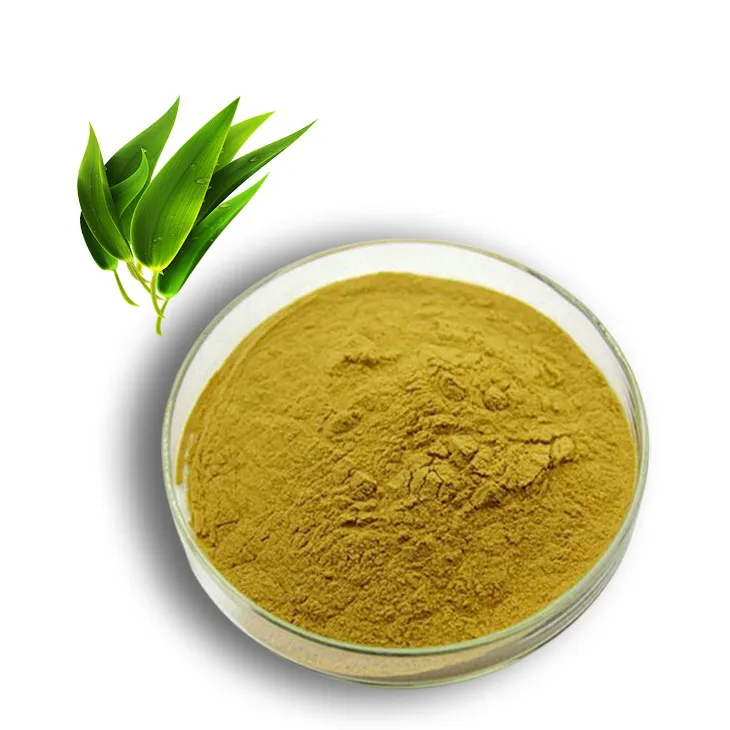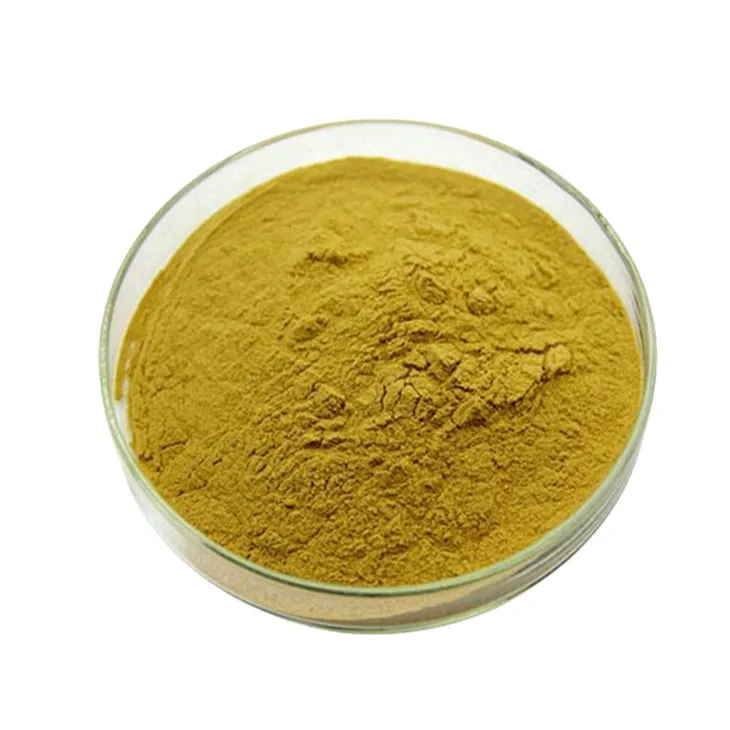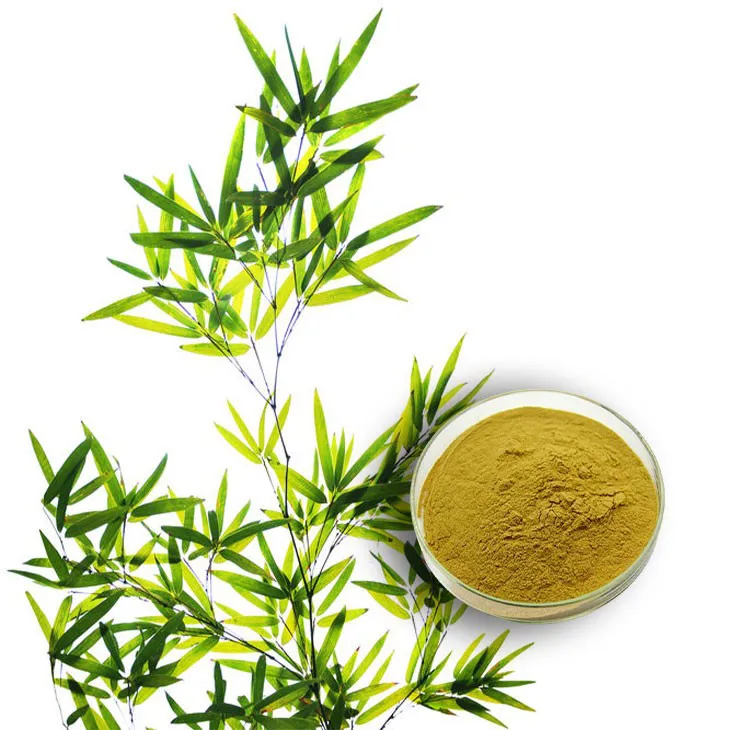- 0086-571-85302990
- sales@greenskybio.com
The best bamboo leaf extract in nature.
2024-11-30

Introduction
Nature is a vast reservoir of beneficial substances, and among them, Bamboo Leaf extract stands out as a remarkable natural resource. Bamboo, a plant known for its elegance and versatility, has leaves that are packed with a plethora of bioactive compounds. These extracts have been gaining increasing attention in recent years due to their diverse potential applications.

The Composition of Bamboo Leaf extract
Bamboo leaves are rich in a variety of substances. One of the most significant groups of compounds present is flavonoids. Flavonoids are well - known for their antioxidant and anti - inflammatory properties. They play a crucial role in protecting the body from oxidative stress and inflammation, which are associated with numerous diseases.
Another important component is phenolic acids. These acids contribute to the overall antioxidant capacity of the Bamboo Leaf extract. They also have potential antimicrobial properties, which could be useful in various applications such as food preservation.
The presence of polysaccharides in bamboo leaf extract is also notable. Polysaccharides are complex carbohydrates that may have immunomodulatory effects. They can potentially enhance the body's immune system, making it more resistant to infections.

Antioxidant Properties
Antioxidants are substances that can neutralize free radicals in the body. Free radicals are highly reactive molecules that can cause damage to cells, proteins, and DNA. This damage is associated with aging and various diseases such as cancer, heart disease, and neurodegenerative disorders.
Bamboo leaf extract has been shown to possess strong antioxidant properties. The flavonoids and phenolic acids in the extract act as free - radical scavengers. They can donate electrons to free radicals, thereby neutralizing them and preventing them from causing further damage.
In vitro studies have demonstrated the ability of bamboo leaf extract to inhibit lipid peroxidation. Lipid peroxidation is a process in which free radicals attack lipids in cell membranes, leading to membrane damage. By inhibiting this process, bamboo leaf extract can help maintain the integrity of cell membranes.

Anti - Inflammatory Effects
As mentioned earlier, the flavonoids in bamboo leaf extract may have anti - inflammatory effects. Inflammation is a natural response of the body to injury or infection. However, chronic inflammation can be harmful and is associated with many diseases.
Studies have suggested that bamboo leaf extract can modulate the inflammatory response. It may do this by inhibiting the production of inflammatory mediators such as cytokines and prostaglandins. By reducing inflammation, bamboo leaf extract has the potential to be used in the treatment of inflammatory diseases such as arthritis.
Animal studies have shown that bamboo leaf extract can reduce swelling and pain in inflamed tissues. This provides further evidence of its anti - inflammatory potential.

Traditional Medicine Use
In some cultures, bamboo leaf extracts have been used for centuries in traditional medicine. In traditional Chinese medicine, for example, bamboo leaves have been used to clear heat, promote fluid production, and relieve restlessness.
They were often used in herbal formulations to treat conditions such as fevers, thirst, and irritability. The long - standing use in traditional medicine indicates that bamboo leaf extracts may have potential health - promoting qualities.
However, it should be noted that traditional medicine uses are based on historical experience and may not always be fully understood in terms of modern scientific mechanisms.
Modern Research and Applications
Medicine
In modern medicine, researchers are exploring the potential of bamboo leaf extract in various areas. One area of interest is its use in preventing and treating cardiovascular diseases. The antioxidant and anti - inflammatory properties of the extract may help reduce the risk of heart disease by preventing the oxidation of low - density lipoproteins (LDL) and reducing inflammation in blood vessels.
There is also potential for its use in cancer prevention and treatment. Some studies have suggested that the bioactive compounds in bamboo leaf extract may have anti - cancer properties. They may be able to inhibit the growth and spread of cancer cells, although more research is needed in this area.
Another potential application is in the treatment of neurodegenerative diseases such as Alzheimer's and Parkinson's. The antioxidant properties of the extract may help protect neurons from oxidative damage, which is thought to play a role in these diseases.
Cosmetics
The antioxidant and anti - inflammatory properties of bamboo leaf extract also make it a valuable ingredient in cosmetics. It can be used in skin care products to protect the skin from environmental damage, such as UV radiation and pollution.
It may also have anti - aging effects. By reducing oxidative stress and inflammation in the skin, bamboo leaf extract can help maintain the elasticity and smoothness of the skin, reducing the appearance of wrinkles and fine lines.
In hair care products, it may be used to strengthen hair follicles and improve the overall health of the hair. It can potentially prevent hair loss and promote hair growth.
Food Supplements
Bamboo leaf extract can be used as a food supplement due to its potential health benefits. It can be added to various foods and beverages to enhance their nutritional value.
For example, it can be added to functional drinks to provide antioxidant and anti - inflammatory benefits. It may also be used in dietary supplements in capsule or tablet form for those who want to improve their overall health.
Challenges and Future Directions
Despite the promising potential of bamboo leaf extract, there are also some challenges. One challenge is the standardization of extraction methods. Different extraction methods can result in different compositions and potencies of the extract.
Another challenge is the need for more in - vivo and clinical studies. Most of the current research is based on in - vitro studies or animal models. Clinical trials are needed to confirm the safety and efficacy of bamboo leaf extract in humans.
In the future, more research is needed to fully understand the mechanisms of action of bamboo leaf extract. This will help in the development of more effective products based on this natural resource.
There is also potential for the development of new extraction and purification techniques to improve the quality and yield of bamboo leaf extract.
FAQ:
What are the main bioactive compounds in bamboo leaf extracts?
Bamboo leaf extracts are rich in various bioactive compounds. One of the main types is flavonoids. These flavonoids contribute to the potential anti - inflammatory effects of the extracts. Additionally, there are other compounds present which together give the extracts antioxidant properties, enabling them to combat free radicals in the body.
How do bamboo leaf extracts combat free radicals?
The antioxidant properties of bamboo leaf extracts play a crucial role in combating free radicals. The bioactive compounds within the extracts, such as flavonoids, have the ability to neutralize free radicals. Free radicals are unstable molecules that can cause damage to cells in the body. By interacting with these free radicals, the compounds in bamboo leaf extracts prevent them from causing oxidative stress and subsequent harm to the body's cells.
What are the potential applications of bamboo leaf extracts in medicine?
In medicine, bamboo leaf extracts have several potential applications. Due to their antioxidant and anti - inflammatory properties, they may be used in the development of drugs or treatments for conditions related to oxidative stress and inflammation. For example, they could potentially be explored for treating certain chronic diseases where inflammation plays a significant role. However, more research is still needed to fully understand and harness these potential medical applications.
How are bamboo leaf extracts used in cosmetics?
Bamboo leaf extracts can be used in cosmetics mainly because of their antioxidant properties. Antioxidants are beneficial for skin health as they can protect the skin from damage caused by free radicals. These extracts may be incorporated into products such as creams, lotions, and serums to help prevent premature aging of the skin, improve skin texture, and potentially reduce inflammation - related skin problems.
Are there any side effects of using bamboo leaf extracts?
Currently, there is limited research on the side effects of bamboo leaf extracts. However, as with any natural product, individual sensitivities may exist. Some people may experience allergic reactions, although this is relatively rare. It is always important to conduct proper safety tests and consult a healthcare professional before using products containing bamboo leaf extracts, especially in high concentrations or for long - term use.
Related literature
- Antioxidant and Anti - inflammatory Activities of Bamboo Leaf Extracts"
- "Bamboo Leaf Extract: A Potential Source for Natural Health Products"
- "Bioactive Compounds in Bamboo Leaves and Their Applications"
- ▶ Hesperidin
- ▶ citrus bioflavonoids
- ▶ plant extract
- ▶ lycopene
- ▶ Diosmin
- ▶ Grape seed extract
- ▶ Sea buckthorn Juice Powder
- ▶ Beetroot powder
- ▶ Hops Extract
- ▶ Artichoke Extract
- ▶ Reishi mushroom extract
- ▶ Astaxanthin
- ▶ Green Tea Extract
- ▶ Curcumin Extract
- ▶ Horse Chestnut Extract
- ▶ Other Problems
- ▶ Boswellia Serrata Extract
- ▶ Resveratrol Extract
- ▶ Marigold Extract
- ▶ Grape Leaf Extract
- ▶ blog3
- ▶ blog4
-
Chinese melatonin factories.
2024-11-30
-
Certified organic kidney bean extract.
2024-11-30
-
Cocoa Extract
2024-11-30
-
Lotus leaf extract
2024-11-30
-
Black Garlic Extract
2024-11-30
-
Resveratrol extract
2024-11-30
-
Artichoke Extract
2024-11-30
-
Grapefruit Seed Extract Powder
2024-11-30
-
Milk Thistle Extract
2024-11-30
-
Thunder God Vine Extract
2024-11-30
-
Peppermint Extract Powder
2024-11-30
-
Yam Extract
2024-11-30





















